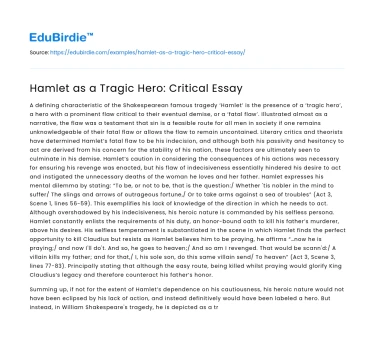A defining characteristic of the Shakespearean famous tragedy ‘Hamlet’ is the presence of a ‘tragic hero’, a hero with a prominent flaw critical to their eventual demise, or a ‘fatal flaw’. Illustrated almost as a narrative, the flaw was a testament that sin is a feasible route for all men in society if one remains unknowledgeable of their fatal flaw or allows the flaw to remain uncontained. Literary critics and theorists have determined Hamlet’s fatal flaw to be his indecision, and although both his passivity and hesitancy to act are derived from his concern for the stability of his nation, these factors are ultimately seen to culminate in his demise. Hamlet’s caution in considering the consequences of his actions was necessary for ensuring his revenge was enacted, but his flaw of indecisiveness essentially hindered his desire to act and instigated the unnecessary deaths of the woman he loves and her father. Hamlet expresses his mental dilemma by stating: “To be, or not to be, that is the question:/ Whether 'tis nobler in the mind to suffer/ The slings and arrows of outrageous fortune,/ Or to take arms against a sea of troubles” (Act 3, Scene 1, lines 56-59). This exemplifies his lack of knowledge of the direction in which he needs to act. Although overshadowed by his indecisiveness, his heroic nature is commanded by his selfless persona. Hamlet constantly enlists the requirements of his duty, an honor-bound oath to kill his father’s murderer, above his desires. His selfless temperament is substantiated in the scene in which Hamlet finds the perfect opportunity to kill Claudius but resists as Hamlet believes him to be praying, he affirms “…now he is praying;/ and now I'll do't. And so, he goes to heaven;/ And so am I revenged. That would be scann'd:/ A villain kills my father; and for that,/ I, his sole son, do this same villain send/ To heaven” (Act 3, Scene 3, lines 77-83). Principally stating that although the easy route, being killed whilst praying would glorify King Claudius’s legacy and therefore counteract his father’s honor.
Summing up, if not for the extent of Hamlet’s dependence on his cautiousness, his heroic nature would not have been eclipsed by his lack of action, and instead definitively would have been labeled a hero. But instead, in William Shakespeare's tragedy, he is depicted as a tragic hero, a man dictated by his fatal flaw.
Save your time!
We can take care of your essay
- Proper editing and formatting
- Free revision, title page, and bibliography
- Flexible prices and money-back guarantee
Did you like this example?
Make sure you submit a unique essay
Our writers will provide you with an essay sample written from scratch: any topic, any deadline, any instructions.
Cite this paper
-
APA
-
MLA
-
Harvard
-
Vancouver
Hamlet as a Tragic Hero: Critical Essay.
(2023, October 26). Edubirdie. Retrieved December 22, 2024, from https://edubirdie.com/examples/hamlet-as-a-tragic-hero-critical-essay/
“Hamlet as a Tragic Hero: Critical Essay.” Edubirdie, 26 Oct. 2023, edubirdie.com/examples/hamlet-as-a-tragic-hero-critical-essay/
Hamlet as a Tragic Hero: Critical Essay. [online].
Available at: <https://edubirdie.com/examples/hamlet-as-a-tragic-hero-critical-essay/> [Accessed 22 Dec. 2024].
Hamlet as a Tragic Hero: Critical Essay [Internet]. Edubirdie.
2023 Oct 26 [cited 2024 Dec 22].
Available from: https://edubirdie.com/examples/hamlet-as-a-tragic-hero-critical-essay/
copy






 Stuck on your essay?
Stuck on your essay?

